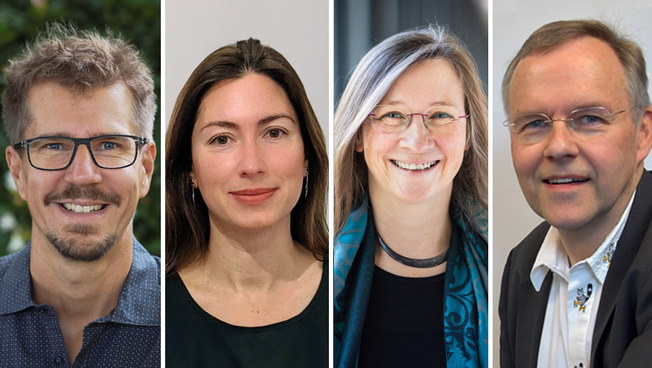26 April 2024
€13.8 million to train doctoral researchersUniversität Hamburg Part of 4 New EU Networks for Doctoral Researchers

Photo: private (2), UHH/Esfandiari, UHH/Knowledge Technology
The Doctoral Networks (DN) are one of the Marie Skłodowska-Curie Actions, a program launched in 1997. As part of the DN, transnational doctoral programs with different institutions have enjoyed funding. The goal is to provide structured training to doctoral researchers in newly emerging fields of research, to improve the career prospects of researchers through international, interdisciplinary, and intersectoral mobility, and to strengthen knowledge exchange between the participating institutions.
“Doing a doctorate is a milestone on the path towards an academic career. This makes it all the more important to provide structured support to doctoral researchers in this intensive phase. The Doctoral Networks are a great instrument for focusing on important and promising fields and at the same time to get to know and exploit different perspectives of the research topic. This is why I am so happy for my colleagues, who will be taking part in the 4 new networks,” said Prof. Dr. Tilo Böhmann, vice president for research, doctoral and early career researchers, and information management.
European Compact Accelerators, Their Applications, and Entrepreneurship (EPACE)—Prof. Dr. Gudrid Moortgat-Pick, Department of Physics
In this decade, there are many new technologies for plasma accelerators and laser-based x-ray sources on the horizon. Training the next generation of doctoral and early career researchers in these pioneering technologies is therefore crucial. The focus of EPACE is to make plasma accelerators functional for high-energy experiments for the transport of polarized particles while also reducing energy consumption. The technologies should also be not just more efficient and sustainable but also open up new possibilities in science, medicine, and industry. In EPACE, 31 industrial and academic partners in Europe will be working together, with DESY coordinating, to train 15 doctoral researchers.
Characterization and Recovery of Bionanoparticles for Vaccine Delivery and Gene Therapy (CAARE)—Prof. Dr. Irene Fernandez-Cuesta, Department of Physics
CAARE will focus on a new class of molecules known as “bionanoparticles.” Currently, they are already being used as vaccines, mRNA vaccines, or in gene therapy. The new biopharmaceuticals will fill an urgent gap in medicine because they could offer treatment options for rare diseases. The effects of the production process on the quality and efficacy of the end products for such treatments and patient safety have yet to be fully clarified, however. Furthermore, there is no specially qualified personnel in the field of bionanoparticles. CAARE aims to close these gaps and will involve the training of 14 doctoral researchers who will gain the latest knowledge in bioprocessing and analysis to clean up bionanoparticles. ACIB GMBH, based in Austria, is coordinating this network.
Harnessing the DNA Damage Response to Improve Plant Tolerance to Heat Stress (HEATDDR)—Prof. Dr. Arp Schnittger, Department of Biology
In connection with climate change, Europe is facing new challenges when it comes to ensuring the populations’ food security. For example, summer heat waves reduce plant growth and thus harvests. We therefore urgently need to develop innovative strategies for improving plants’ tolerance to heat. Initial research findings show that growth reduction depends at least in part on the activation of the DNA Damage Response (DDR) of plants. HeatDDR focuses on building upon prior knowledge to decode the connections between the DDR and plant reactions to heat stress. It should also develop methods for finely coordinating these cellular reactions and to facilitate the survival of plants without adversely affecting growth. HeatDDR will combine different approaches, including those is biochemistry, molecular biology, cell biology, genetics, computer biology, and plant phenotyping. Paris-Sacly University in France is coordinating the network.
Social aWareness for sErvicE roboTs (SWEET)—Prof. Dr. Stefan Wermter, Department of Informatics
The development of assistive robots able to fulfill social conventions and expectations and to avoid rejection by humans demands that assistive robots be aware of the social contexts in which they act. SWEET aims to train a new generation of researchers to advance the development of socially-functioning robots. This means that the robots can perceive, interpret, and respond to human emotions, intentions, and cultural differences. The training program will offer a multifaceted curriculum and cover theory, practical technical skills, and real-world application scenarios. The network’s interdisciplinary approach includes different areas such as AI, machine learning, human-robot interaction, computer vision, and the cognitive sciences. SWEET places great value on ethical considerations and responsible innovation. The network is being coordinated by Universitá Degli Studi Di Napoli Federico II in Italy.
